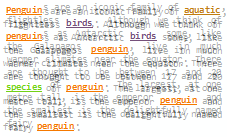 Most linear-time string searching algorithms are tricky to implement, and require heavy preprocessing of the pattern before running the search. This article presents the Rabin-Karp algorithm, a simple probabilistic string searching algorithm based on hashing and polynomial equality testing, along with a Python implementation. A streaming variant of the algorithm and a generalization to searching for multiple patterns in one pass over the input are also described, and performance aspects are discussed.
Most linear-time string searching algorithms are tricky to implement, and require heavy preprocessing of the pattern before running the search. This article presents the Rabin-Karp algorithm, a simple probabilistic string searching algorithm based on hashing and polynomial equality testing, along with a Python implementation. A streaming variant of the algorithm and a generalization to searching for multiple patterns in one pass over the input are also described, and performance aspects are discussed.
The algorithm is probabilistic in that it doesn’t always return correct results; more precisely, it returns all valid matches and (with reasonably small probability) a few incorrect matches (algorithms such as this one that tend to be over-optimistic in reporting their results are usually said to be true-biased).
.png) Comparing strings is often — erroneously — said to be a costly process. In this article I derive the theoretical asymptotic cost of comparing random strings of arbitrary length, and measure it in C, C++, C# and Python.
Comparing strings is often — erroneously — said to be a costly process. In this article I derive the theoretical asymptotic cost of comparing random strings of arbitrary length, and measure it in C, C++, C# and Python. In a famous article published 1951 ((Various techniques used in connection with random digits. NIST journal, Applied Math Series, 12:36-38, 1951. This article does not seem to be available online, though it is widely cited. It is reprinted in pages 768-770 of Von Neumann’s collected works, Vol. 5, Pergamon Press 1961)), John Von Neumann presented a way of skew-correcting a stream of random digits so as to ensure that 0s and 1s appeared with equal probability. This article introduces a simple and mentally workable generalization of his technique to random dice, so a loaded die can be used to uniformly draw numbers from the set \(\{1, 2, 3, 4, 5, 6\}\), with reasonable success.
In a famous article published 1951 ((Various techniques used in connection with random digits. NIST journal, Applied Math Series, 12:36-38, 1951. This article does not seem to be available online, though it is widely cited. It is reprinted in pages 768-770 of Von Neumann’s collected works, Vol. 5, Pergamon Press 1961)), John Von Neumann presented a way of skew-correcting a stream of random digits so as to ensure that 0s and 1s appeared with equal probability. This article introduces a simple and mentally workable generalization of his technique to random dice, so a loaded die can be used to uniformly draw numbers from the set \(\{1, 2, 3, 4, 5, 6\}\), with reasonable success.